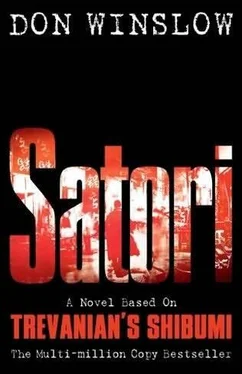“You had an assassination team in place.”
“What are you talking about?” Haverford asked as they walked past stands selling everything from cold soup to silk parasols. “If something went wrong in Beijing, it had nothing to do with us.”
But Haverford had to wonder. Was it possible that stupid bastard Diamond had co-opted the extraction team in an attempt to terminate Hel? What are you thinking? he asked himself. Of course it’s possible. And now Hel blames you.
Nicholai herded him out onto the street. Boulevard de la Somme was busy with evening traffic. If Haverford was going to try anything, it would have been in the market. “You can turn around.”
Haverford, a look of hurt innocence in his eyes, turned to face him. “You have this all wrong. I don’t know what happened back there. Maybe Chinese intelligence made you, somebody flipped, I don’t know. How did you get -”
“You owe me money,” Nicholai said, “a new passport, and certain addresses in the United States. I’ll forgive the monetary debt, but -”
There it is, Haverford thought. Hel had done just what I figured he’d do. Amazing – and characteristic. “Nicholai, did you bring those weapons into -”
“I will require the passport and the addresses.”
“Of course,” Haverford said, “There’s no problem with that. The sooner the better, in fact. You have to go underground, Nick. The whole world is looking for you.”
Nicholai suspected that by “underground” Haverford meant “under the ground,” but in either case had little choice but to go along. “How soon can you get me the addresses and the papers?”
“Tomorrow,” Haverford answered. “Or the next day, at the latest. I’ll set up a meeting point -”
“I’ll tell you when and where,” Nicholai said. Then he asked, “Where is Solange?”
“I don’t know. Why -”
“Don’t lie to me, I don’t like it,” Nicholai snapped. “You brought her here, knowing I would come.”
“You have it all wrong, Nicholai.”
“Yes, I had Beijing all wrong, too, didn’t I?”
He saw a cyclo-pousse coming down the street, flagged it down, and moved Haverford out to the curb. “Get in.”
“I don’t -”
“Get in.”
Haverford got in.
When he turned back around, Hel had disappeared.
YU RECEIVED THE MESSAGE from Saigon.
Hel had made contact.
You are an interesting man, Nicholai Hel, he thought.
HAVERFORD SAT in the back of the cyclo-pousse and contemplated the state of Nicholai Hel’s mind.
Had he come to Saigon for Solange?
Or for other reasons?
And, if so, what were they?
As for Solange, how – and why – had she come to Saigon, and what was she doing? He recalled Singleton’s orders back in Washington. You’re clever young men. Lure him in.
Well, it looks like we both did.
NICHOLAI FELT AT EASE in Cholon.
The Chinese quarter of the city, it reminded him of a damper, poorer Shanghai in the old days. The little stands and small shops were the same, the neon signs the same, the smells of cooking over charcoal, the incense wafting from temples, the shouts, the laughter, the crowding – it all reminded him that the Chinese were great wanderers, pilgrims who took their culture with them and replicated their old cities in the new.
He walked along Lao Tu Street, the main thoroughfare, and felt right at home. Cholon was reputed to be dangerous at night, particularly for a kweilo , but Nicholai had never felt threatened even in the worst slums of Shanghai and he didn’t feel in jeopardy here, even as he turned off the street and walked up narrow alleys into a neighborhood of four-story tenements.
Again, they all looked the same – rectangular wooden structures with tiny balconies from which laundry was hung. Men in sleeveless T-shirts leaned against the railings, smoking cigarettes, women inside yelled domestic questions in an attempt to engage their husbands in at least some form of conversation.
On the street itself, young toughs in brightly colored shirts and tight slacks gathered on the corners watching for opportunities, but didn’t see one in the tall colon who walked as if he knew where he was going and what he was doing. And he greeted them in Chinese as he walked past. They left him alone.
Nicholai found the address he was looking for.
The tiny lobby reeked of stale opium smoke.
Nicholai walked up the creaking, slanting staircase to the second floor. The hallway was narrow and slanted, as if it was tired and wanted to lie down. A door opened and a woman, clad in the tight red silk dress of a prostitute, looked at him for a moment, then continued down the hall.
Nicholai knocked on the door of Room 211.
No one answered. He knocked twice more, then opened the unlocked door.
Leotov sat dozing in a rattan chair by the small window. The room was sweltering and tight, and Leotov’s bare chest was shiny with sweat. He wore a pair of khaki trousers and sandals, his face was sallow, and he hadn’t shaved for several days.
The opium pipe was in his lap.
He opened his eyes and saw Nicholai. His eyes were yellow and runny, but wide in the dreamlike state of the opium addict.
“Where the hell have you been?” he muttered in Russian. “I thought you were probably dead.”
“There were moments when we shared that opinion.”
“I’ve been here for weeks,” Leotov said bitterly, clearly blaming his opium habit on Nicholai’s lack of promptness.
“I was detained,” Nicholai answered. “I didn’t count on being so seriously wounded. It delayed me by weeks. Nevertheless, I apologize – it is good of you to have waited.”
Leotov slowly pulled himself up from the chair and shuffled around the room, as if looking for something but unable to remember what or where it was. “You don’t know what it’s been like,” he whined, “being on the run, having to hide in this hovel, never knowing when… I took recourse in the local vice.”
Nicholai could virtually smell the fear and paranoia coming off him. “I see that.”
“Superior bastard,” Leotov spat. “You and him, both superior bastards.”
The “him,” Nicholai supposed, referred to the late Yuri Voroshenin. But he was already bored with Leotov. “Do you have them?”
“I have them,” Leotov said.
As arranged in their encounter in Beijing, Leotov had taken Voroshenin’s passport and personal papers, including his deposit book at the Banque de l’Indochine in Saigon, where the Russian had not only an account but a safety deposit box.
“So?”
“I’m looking, aren’t I?”
He shoved aside some clothes on the floor and came up with a small leather portfolio that he held up in triumph. “Here you go. Here’s your precious papers. Bastards, the both of you.”
Nicholai took the portfolio and flipped through it. Voroshenin’s passport, several bankbooks, scribbled notes.
“Where’s my money?”
Nicholai took bills from his pocket and handed them to Leotov.
“Where’s the rest of it?” Leotov demanded.
“Our arrangement,” Nicholai reminded him, “was one-third now, the rest when I successfully gain access to the safety deposit box.”
The documents looked authentic, but there was no telling until they were put to use.
“When will that be?” Leotov asked.
“Tomorrow. I’ll meet you somewhere.”
“I can barely get organized to make it out of this room.”
“You get out to buy opium, don’t you?” Nicholai asked.
“A boy comes.” Leotov chuckled. “Room service.”
Читать дальше












